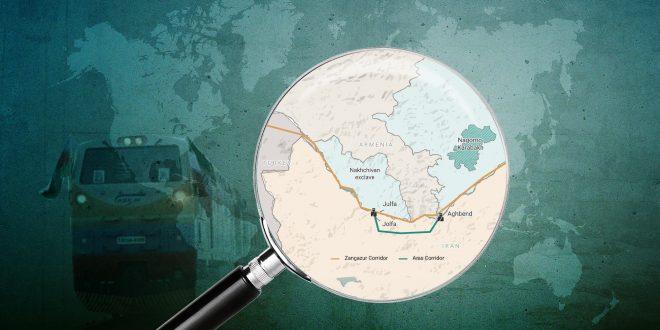Rival transit corridor projects have centered on the South Caucasus as it becomes more and more important in connecting Europe and Asia. These corridors serve as hubs for international trade integration, regional stability, and economic progress in addition to being routes for transit. The Zangezur Corridor is unique among these initiatives because of its substantial geopolitical and economic ramifications. [1]
Due to changes in geopolitics and commercial interests, rivalry for transit routes in the South Caucasus and Central Asia has become more intense, particularly the Middle and Zangezur routes. Quest for control over these routes includes regional players like Armenia and Azerbaijan as well as major ones like China, Russia, Türkiye, and the European Union (EU). Armenia opposes the Zangezur Corridor because it is extraterritorial, despite backing from Turkey and Azerbaijan. [2] In the meantime, especially considering the Western sanctions on Russia, the Middle Corridor has become a competitive alternative to routes under Russian control. In addition to highlighting the strategic value of connectivity, this rivalry can alter regional dynamics and provide both strategic realignments and economic advantages. [3]
Zangezur Corridor
In the South Caucasus, the Zangezur Corridor has grown in importance as a geopolitical undertaking with ramifications for trade, power relations, and regional connectivity. The corridor, which passes through the Syunik Province of Armenia, aims to create a direct transit route between the Nakhichevan exclave of Azerbaijan and the mainland. Regional trade is improved by decreasing dependency on longer and more complicated routes by optimizing the flow of people and products between Türkiye and Azerbaijan. [4]
The Zangezur Corridor has several geopolitical implications. Bypassing Iran and Russia, it gives Türkiye a direct route to the Caspian Sea and Central Asia. Türkiye’s commercial ties with Azerbaijan and the Central Asian countries are strengthened by this new route, which also increases the country’s influence in regional commerce and energy transit. The corridor gives Türkiye greater geopolitical flexibility and strengthens its influence in the area by lowering its reliance on Iranian and Russian networks. [5]
Zangezur Corridor and the Turkic World
The corridor is in line with Türkiye’s larger geopolitical objectives, particularly regarding bolstering relations with the Turkic world, which includes Azerbaijan and Central Asia. Türkiye is hoping to strengthen its political, economic, and cultural relations with countries that speak Turkic tongues by creating a straight path through the South Caucasus. By virtue of this relationship, Türkiye can overcome the geopolitical obstacles offered by Russia and Iran and maintain its leadership position within the Organization of Turkic States (OTS). As a result, the Zangezur Corridor is essential to Türkiye’s long-term plan to become more integrated with the Turkic world, promoting regional commerce and collaboration. [6]
East-West Trade
Additionally, the Zangezur Corridor may play a crucial role in the larger East-West transit network, promoting commerce between Asia and Europe. The corridor would provide an alternative to politically sensitive routes through Russia and Iran by offering a direct path across the South Caucasus. By doing so, travel expenses and delays might be greatly decreased and supply lines throughout the Eurasian continent could become much more efficient. Other infrastructure initiatives, including the Middle Corridor, which links China and Türkiye via Central Asia, would be enhanced by the Zangezur Corridor. All things considered, the Zangezur Corridor may be crucial in determining the course of future international trade routes, and the South Caucasus continues to be a crucial center in the East-West trade dynamic. [7]
Key Stakeholders and Their Interests
The Zangezur Corridor has the capacity to significantly alter the South Caucasus’ geopolitical and economic terrain, attracting the interest of several regional stakeholders who may be in favor of or against its advancement. Since the Zangezur Corridor would avoid Armenian territory and create a direct transportation link between its mainland and the Nakhichevan exclave, Azerbaijan is a major supporter of the project. Enhancing Azerbaijan’s geographical cohesiveness and fortifying economic links with Türkiye, a crucial ally, depend on this relationship. The corridor supports Azerbaijan’s larger geopolitical objectives of reaffirming its leadership in regional connectivity and trade while establishing influence in the South Caucasus. [8]
Türkiye is a big supporter of the Zangezur Corridor because it sees it as a strategically important asset that fits with its geopolitical goals of strengthening its connections with Central Asia and expanding its influence throughout the Turkic world. By avoiding Iran and Russia, the corridor would give Türkiye a direct path to the Caspian Sea and beyond, expanding its significance in regional commerce and energy transportation. To strengthen its relationships with Azerbaijan and other Turkic-speaking countries and broaden its geopolitical and economic influence, Türkiye views this effort as crucial. [9]
Because it perceives the Zangezur Corridor as a challenge to its sovereignty and authority over the Syunik Province, Armenia is against its development. Yerevan worries that the corridor may erode its sovereignty and lessen its negotiating position with Azerbaijan. Armenia is also worried that the corridor may further isolate the nation while strengthening Türkiye and Azerbaijan’s strategic alliance, which would tip the regional power balance in Armenia’s favor. [10] Iran views the Zangezur Corridor as a threat to its status as a vital nation used as a transit route for goods moving between East and West. Iranian land is avoided by the corridor, which lessens its strategic significance in terms of regional trade routes. Furthermore, by tightening links between Türkiye and Azerbaijan and perhaps severing Iran’s direct access to Armenia, a vital regional ally, the corridor may lessen Tehran’s influence in the South Caucasus. [11]
Unblocking Paths to Peace: The Zangezur Corridor Dilemma
The goal of the current peace talks between Armenia and Azerbaijan is to end long-standing disputes that have remained unresolved since the fall of the Soviet Union, especially in relation to the Karabakh territory. In order to guarantee enduring peace and regional stability, both countries are pursuing a comprehensive treaty.
Azerbaijan and Armenia have reached a mutual agreement to withdraw the provision in their current peace negotiations concerning the opening of regional transportation networks, such as the Zangezur Corridor project, by August 2024. This choice has reduced hostilities and expedited the peace treaty’s conclusion. Azerbaijan then pursued a different route through Iran after Armenia withdrew its agreement, citing worries over border security. [12]
Russia has a complex stance on the Zangezur Corridor. Its strong links to Armenia complicate its attitude, even as it sees possibilities to maintain control over regional infrastructure projects and ensure peace in the South Caucasus. While opposing the corridor might lessen Moscow’s role in regional connectivity, supporting it could strain relations with Yerevan, a crucial military partner. In pursuit of its larger geopolitical objectives, Russia must carefully weigh its interests to maintain influence over both Armenia and Azerbaijan. [13]
Through the prism of its Belt and Road Initiative (BRI), China sees the Zangezur Corridor as a possible part of its larger plan to improve connectivity throughout the Eurasian region. Beijing’s objective of establishing more direct land routes—via the South Caucasus in this case—between China and Europe is in line with the corridor. The Zangezur Corridor is a desirable project for Chinese investment and diplomatic backing due to its line with BRI goals. The corridor has the potential to greatly advance China’s aim of a more linked Eurasian economic landscape by lowering cargo transit times and costs between Asia and Europe. [14]
China has a variety of interests in the Zangezur Corridor, including strategic and commercial ones. In terms of the economy, the corridor may present new chances for Chinese companies to enter the South Caucasus and other markets, as well as give Chinese commodities traveling to European markets an alternative path to the Northern Corridor and the Maritime Silk Road route. China views the creation of these corridors as a strategic move that would diversify its trade routes, lessen reliance on ocean transportation, and maybe avoid regions that might be exposed to geopolitical unrest. Furthermore, China wants to increase its economic and political clout and establish itself as a major player in determining the future of Eurasian connectivity and trade patterns by promoting infrastructure development in the area. [15]
Part of the wider Middle Corridor, which links Europe and Asia with Azerbaijan and the South Caucasus, is the Zangezur Corridor. Türkiye gains by having a direct route to the Caspian and Central Asia, avoiding both Russia and Iran, while Azerbaijan gains from the corridor an improved strategic position in regional commerce. This would drastically lessen these two countries’ dominance in regional commerce, changing the geopolitical environment in the South Caucasus. [16]. For Chinese audiences, President Ilham Aliyev has underlined the corridor’s significance and its function within the Middle Corridor. Further promoting Eurasian connection and trade, this route passes via Azerbaijan and connects Turkish, Russian, Central Asian, Iranian, and Armenian regions. [17]
The establishment of the Zangezur Corridor could significantly enhance the Türkiye-Azerbaijan alliance, reshaping the balance of power in the region. By creating a direct land link between Azerbaijan’s Nakhichevan exclave and the mainland, the corridor would not only strengthen Azerbaijan’s territorial unity but also deepen its economic and political relationship with Türkiye. This increased connectivity would elevate Türkiye’s role in regional trade and energy networks, reinforcing its leadership within the Turkic world and extending its influence from Central Asia to Europe. [18] The closer cooperation between Türkiye and Azerbaijan could weaken the strategic positions of regional powers such as Iran and Russia, whose roles as major transit routes could be diminished. As the Türkiye-Azerbaijan partnership grows stronger, it may reduce the importance of Iranian and Russian corridors, shifting regional dynamics and potentially intensifying competition and geopolitical tensions among key actors. [19]
Aras Corridor
Recently, Iran and Azerbaijan decided to create the “Aras Corridor,” a new transit route. The village of Aghband in Azerbaijan’s Zangilan District will be connected to the city of Ordubad in southern Nakhichevan via this corridor, which will pass through Iran’s East Azerbaijan Province. The Aras Corridor, which avoids Armenia, offers a feasible substitute for the Zangezur Corridor and may allay Iran’s worries over its border with Armenia. On 11 March 2022, Tehran and Baku decided to build new roads, railways, and energy supply lines that will connect Nakhichevan and Azerbaijan’s East Zangezur Economic Region via Iranian territory. This infrastructure project is changing regional power dynamics and bolstering economic and strategic cooperation among South Caucasus states, in addition to enabling trade and commercial contacts. [20]
Strategic Importance
Because it circumvents Armenian territory and offers a vital transit route across Iran’s East Azerbaijan Province, the Aras Corridor is strategically essential. Through Iranian territory, the corridor links Nakhichevan with the Azerbaijani mainland, thus avoiding the geopolitical issues connected with the Zangezur Corridor and potentially allaying Iran’s fears of losing access to Armenia. This route can not only facilitate commerce but also change regional alignments by lowering tensions and enhancing economic integration among important South Caucasus participants. [21]
Key Stakeholders and Their Interests
Given that the Aras Corridor has the potential to change trade routes and strengthen economic relations throughout the South Caucasus, several regional powers have a stake in it. Seen as a strategic advantage, it allows Iran and Azerbaijan to improve their logistical capabilities while avoiding vulnerable regions like Armenia. By providing an alternative to the Zangezur Corridor and influencing regional alignments, the corridor is also anticipated to have an impact on regional dynamics.
Iran
Despite its commitment to the Aras Corridor, Iran is also seeking to diversify its trade routes by building a rail link through Armenia and Georgia to the Black Sea. This move highlights Iran’s broader strategic calculations, reflecting ongoing regional tensions, particularly with Azerbaijan. Tehran views the Aras Corridor as a critical means to maintain its influence in regional transit networks while avoiding reliance on Armenian territory. Iran’s stance is driven by its opposition to the Zangezur Corridor, which it perceives as undermining its trade access through Armenia and complicating its regional geopolitical interests. [22]
Türkiye’s larger regional goals impact its strategy in the Aras Corridor. Türkiye is nevertheless committed to improving commercial connections within the area, even though the Aras Corridor avoids the controversial Zangezur route. The Zangezur Corridor is strategically significant for Türkiye since it provides a direct route to Central Asia. However, Turkey’s involvement in these projects is complicated by Armenia’s slow peace talks and its interactions with major powers like Russia, the U.S., and Iran. Realizing the potential of the Aras and Zangezur Corridors depends on Armenia advancing in restoring ties and resolving transit concerns, which is why Türkiye supports Azerbaijan. [23]
Economic and Connectivity Impact
There is a lot of potential for the Aras Corridor to improve regional commerce and economic integration. More effective transit routes for products and services can be facilitated by the corridor by enhancing connections between Azerbaijan, Türkiye, and Central Asia. It is anticipated that this enhanced infrastructure would shorten travel times and lower prices, increasing the viability of commerce for local companies. Because of its advantageous position, the corridor can play a significant role in the larger Eurasian transportation network, which might lead to an increase in the amount of commerce that passes through the South Caucasus. [24]
By improving connections between Azerbaijan, Türkiye, and Central Asia and promoting a more integrated economic environment, the Aras Corridor has the potential to significantly alter regional trade and economic dynamics. Through the creation of more efficient and seamless transit lines, the corridor has the potential to greatly increase trade and economic cooperation between these regions. Furthermore, its growth is in line with and supportive of larger infrastructure projects like the INSTC, which aims to establish a comprehensive multimodal transport network connecting Russia, India, and Iran to Europe, thereby enhancing regional integration and international trade ties. This cooperative impact enhances the corridor’s status as a vital hub in international transportation networks while also fostering economic growth in the nearby areas. [25]
Key Hurdles in Developing the Aras Corridor
There are several significant barriers to the construction of the Aras Corridor, from intricate infrastructural needs to geopolitical difficulties. Due to budgetary limitations and the absence of a rail connection between Azerbaijan and Nakhichevan, significant investment is required to construct roads and bridges, which complicates the project. Further endangering the corridor’s effective implementation and long-term sustainability are regional geopolitical factors involving important parties including Iran, Armenia, and Türkiye, as well as possible competition from the Zangezur Corridor.
Infrastructure and Financing Challenges: The absence of a rail connection is a significant obstacle, even though a road already connects Azerbaijan and Nakhichevan through Iran. While finance negotiations between Azerbaijan and Iran continue, the establishment of a railway network linking the two territories would need a significant financial investment. Building a bridge across the Aras River, which would connect the railway to the current road network, is one of the essential elements. The intricacy and expense of these infrastructural advancements give rise to doubts regarding the project’s feasibility. [26]
Geopolitical Complexities: A complicated web of geopolitical interactions among regional nations, including Azerbaijan, Iran, Armenia, Türkiye, and Russia, has an impact on the Aras Corridor. Changes in security concerns, political allegiances, or disputes may impede the project’s advancement by impacting investment patterns and logistical procedures. The strategic significance of the corridor may also change due to shifts in regional conflicts or political backing, which would affect the corridor’s capacity to improve connectivity and regional trade. [27]
Competition from the Zangezur Corridor: The Aras Corridor faces danger from the possible competition from the Zangezur Corridor. A more effective and politically secure path for regional commerce may be provided by the Zangezur Corridor if Armenia and Azerbaijan were to come to a peace deal and mend their relations with Türkiye. Because the Zangezur Corridor may attract investments and attention, the Aras Corridor’s potential influence on regional economic integration would be limited, hence diminishing its strategic significance. [28]
U.S. Geopolitical Opposition: If the Aras Corridor projects support to nations that have competing interests, the U.S. may view it as a threat to its strategic interests in the region. U.S. opposition to investment in the corridor may take the form of diplomatic pressure, economic sanctions, or other measures. This resistance might make the project less financially secure, increase geopolitical risks, and turn off possible backers. [29]
Security Concerns: Given Armenia’s resistance to Azerbaijan’s requests for “unimpeded access” through the Zangezur Corridor, security concerns around the corridor represent another significant barrier. Azerbaijan demands free access, while Armenia is eager to preserve sovereignty and border control, insisting on the existence of customs checks. Negotiations are complicated by the tension around these requests, which also raises questions regarding Armenia’s territorial integrity. [30]
Russia’s Role: The geopolitical environment is made more complex by Russia’s possible participation as a security guarantee. The Aras and Zangezur Corridors’ operational and legal frameworks are made more difficult by Moscow’s desire to retain its influence in the area. The development of infrastructure is intricately linked to regional power dynamics and the potential role of Russia in ensuring the security of the corridor, making advancement more challenging. [31]
Establishing Trust Between Azerbaijan and Armenia: A major barrier still exists between Armenia and Azerbaijan due to a lack of trust. Finding mutually acceptable conditions for the execution of the corridor is made more difficult by decades of strife and a lack of economic collaboration between the two nations. Long-term stability is hampered by the increased likelihood of future conflicts over corridor operations in the absence of trust. Mutually agreeable corridor implementation might promote predictability and prevent future confrontations. [32]
Leverage in Negotiations: Armenia is facing increased pressure in the Zangezur Corridor talks because of Azerbaijan’s emphasis on using Iran as a substitute transit route. By stressing the Aras Corridor’s feasibility, Azerbaijan fortifies its negotiating position and pressures Armenia to make compromises. This dynamic has an impact on the larger discussions since, should Armenia ignore Azerbaijan’s demands on the Zangezur Corridor, it might encounter serious difficulties. [33]
Tension between Iran and Russia
Tensions between Iran and Russia have intensified over the proposed Zangezur Corridor, with Russia, led by Foreign Minister Sergey Lavrov, expressing support for the corridor’s creation. Iran, however, views the project as a threat to its national interests and border security. [34] On 3 September 2024, Iran summoned the Russian ambassador to voice its displeasure with Moscow’s position, stressing that any alteration to internationally recognized borders or regional geopolitical changes is unacceptable. [35] Iran fears the corridor could disrupt its border with Armenia, seen as a key route to Europe, increase Russian military presence in the area, promote a so-called Turkic agenda that strengthens Türkiye and NATO, and potentially serve as a channel for Israel to exploit Iran’s northern vulnerability. [36] This disagreement marks a significant shift in Iran-Russia relations, as it is the first time Iran has openly criticized Russia on the matter. The tension arises as both nations approach a new bilateral treaty amid fresh Western sanctions. To calm the situation, Russia acknowledged Iran’s concerns and emphasized that any agreements must be reached through mutual consent. [37] Despite these differences, Iran and Russia continue to collaborate in areas such as energy and economics, as both are impacted by Western sanctions. The situation is evolving, with potential consequences for regional geopolitics and the power dynamics in the South Caucasus. [38]
Conclusion
As a substitute for the Zangezur Corridor, the Aras Corridor has the capacity to profoundly change regional dynamics in the South Caucasus. By avoiding Armenia and going through Iran, this route gives Azerbaijan direct access to Nakhichevan, diminishing Armenia’s significance in regional connectivity. It avoids the Zangezur Corridor’s geopolitical difficulties, such as questions of sovereignty and control over the corridor. Armenia’s geopolitical significance may be diminished by the Aras Corridor, while economic ties between Iran, Türkiye, and Azerbaijan may be strengthened. It may be a more stable solution for promoting regional trade and collaboration due to its political viability.
Iran’s influence and relevance in regional infrastructure projects, such as the Middle Corridor, are strengthened from a geopolitical standpoint by the Aras Corridor. This change could benefit Iran and Azerbaijan while further marginalizing Armenia. Also, China’s strategic importance in promoting Eurasian commerce is highlighted by its participation in the corridor through the BRI. On the other hand, Russia sees the Zangezur Corridor as a counterbalance to Western dominance, complicated by the geopolitical picture of the region, while the U.S. and its allies see it as a crucial link for Western-backed efforts. Iran’s protests about Russia’s backing of the Zangezur Corridor, which puts Iran’s security and border stability at risk, led to the emergence of tensions between the two countries in September 2024. Although the situation is still precarious, both nations continue to collaborate on energy and economic concerns despite these tensions.
Significant infrastructure and logistical hurdles exist for both lines, not to mention the funding needed for the Aras Corridor, particularly for the building of trains and bridges as well as the completion of financial agreements between Iran and Azerbaijan. However, Iran’s economic woes and sanctions make it doubtful that it will be able to finance these projects, which might impede progress and reduce the corridor’s usefulness.
De-escalating regional tensions, enhancing border control, and addressing security problems are critical to the Aras Corridor’s long-term success. By removing these obstacles, the route may become more competitive and transportation costs may be decreased. In the end, how China, Russia, and the U.S. handle their geopolitical issues will determine whether the Aras or Zangezur Corridors are successful. Future Eurasian connectivity depends on these corridors, and how they grow will be influenced by the shifting power dynamics among important international players.
References
[1] Piotr Gawliczek and Khayal Iskandarov, “The Zangezur corridor as part of the global transport route (against the backdrop of power games in the South Caucasus region,” Security and Defence Quarterly 41, no. 1 (2023): https://securityanddefence.pl/The-Zangezur-corridor-as-part-of-the-global-transport-route-against-the-backdrop,161993,0,2.html. [2] Ibid. [3] Ata Mahamad, “Zangezur Corridor: Russia and Iran in Conflict over Caucasus Link,” IranWire, September 9, 2024, https://iranwire.com/en/politics/133729-zangezur-corridor-russia-and-iran-in-conflict-over-caucasus-link/. [4] “What is the Zangezur Corridor and why does it matter to Eurasia?,” TRT World, https://www.trtworld.com/magazine/what-is-the-zangezur-corridor-and-why-does-it-matter-to-eurasia-58405. [5] Anri R. Chedia, “Zangezur Corridor: Economic Potential and Political Constraints,” Russia in Global Affairs 22 no. 1 (2024): ( https://eng.globalaffairs.ru/articles/zangezur-corridor/. [6] Ayse Isin Kirenci, ”This is what you need to know about the Zangezur Corridor,” TRT World, https://www.trtworld.com/turkiye/this-is-what-you-need-to-know-about-the-zangezur-corridor-13698833. [7] Piotr Gawliczek and Khayal Iskandarov, “The Zangezur corridor as part of the global transport route (against the backdrop of power games in the South Caucasus region.” [8] Ruslan Rehimov, “Azerbaijan accelerates Zangezur corridor construction, opening vital transport routes,” Andolu Agency, January 9, 2024, https://www.aa.com.tr/en/europe/azerbaijan-accelerates-zangezur-corridor-construction-opening-vital-transport-routes/3104421. [9] Aysegul Ketenci, “3 QUESTIONS – Importance of Zangezur corridor for the region explained,” Anadolu Agency, December 21, 2022, https://www.aa.com.tr/en/analysis/3-questions-importance-of-zangezur-corridor-for-the-region-explained/2769019. [10] Anna Ohanyan, “Azerbaijan’s Armenian ‘Corridor’ Is a Challenge to the Global Rules-Based Order,” Foreign Policy, October 23, 2023, https://foreignpolicy.com/2023/11/02/azerbaijan-armenia-zangezur-corridor/. [11] Umud Shokri, “Why Iran Opposes Azerbaijan’s Zangezur Corridor Project,” The Gulf International Forum, September 22, 2022, https://gulfif.org/why-iran-opposes-azerbaijans-zangezur-corridor-project/. [12] Gunay Hajiyeva, “Azerbaijan, Armenia Temporarily Remove Zangezur Corridor Issue from Peace Deal, Facilitating Progress in Peace Talks,” Caspian News, August 9, 2024. [13] Anri R. Chedia, “Zangezur Corridor: Economic Potential and Political Constraints.” [14] Vadim Mansurov, “Russia, China show great interest in Zangezur corridor,” Caliber, January 16, 2024, https://caliber.az/en/post/russia-china-show-great-interest-in-zangezur-corridor. [15] “How Is the Belt and Road Initiative Advancing China’s Interests?,” China Power, https://chinapower.csis.org/china-belt-and-road-initiative/. [16] “In Beijing, Azerbaijan Advocates for Middle Corridor,” Caucasus Watch, October 18, 2023, https://caucasuswatch.de/en/news/in-beijing-azerbaijan-advocates-for-middle-corridor.html. [17] “Zangezur corridor: A pathway for peace,” AZERTAC, November 27, 2023, https://azertag.az/en/xeber/zangezur_corridor_a_pathway_for_peace-2834743. [18] Fuad Muxtar-Agbabali, “Q&A: Zangezur Corridor – geopolitical battleground for regional and global powers: Iran opposes corridor; Russia, Türkiye, Azerbaijan push forward,” Caliber, September 9, 2024, https://caliber.az/en/post/q-a-zangezur-corridor-geopolitical-battleground-for-regional-and-global-powers. [19] Umud Shokri , “Why Iran Opposes Azerbaijan’s Zangezur Corridor Project.” [20] “Development of ‘Aras Corridor’ between Iran, Azerbaijan,” Mehr News Agency, May 25, 2024, https://en.mehrnews.com/news/215686/Development-of-Aras-Corridor-between-Iran-Azerbaijan. [21] Vali Kaleji, “Is the Aras Corridor an Alternative to Zangezur?,” CACI Analyst, February 6, 2024, https://www.cacianalyst.org/publications/analytical-articles/item/13788-is-the-aras-corridor-an-alternative-to-zangezur?.html. [22] “Illusions about Zangezur Corridor will not come true,” Mehr News Agency, September 7, 2024, https://en.mehrnews.com/news/220770/Illusions-about-Zangezur-Corridor-will-not-come-true. [23] Çağrı Erhan, “Zengezur’a alternatif Aras Koridoru,” Turkiye Gaztesi, April 28, 2024, https://www.turkiyegazetesi.com.tr/kose-yazilari/prof-dr-cagri-erhan/zengezura-alternatif-aras-koridoru-643017. [24] Vali Kaleji, “Is the Aras Corridor an Alternative to Zangezur?” [25] Fuad Muxtar-Agbabali, “Azerbaijan Sets Terms For USA, EU, And Armenia In South Caucasus Geopolitics – OpEd,” Eurasia Review, June 16, 2024, https://www.eurasiareview.com/16062024-azerbaijan-sets-terms-for-usa-eu-and-armenia-in-south-caucasus-geopolitics-oped/#google_vignette. [26] Vali Kaleji, “Is the Aras Corridor an Alternative to Zangezur?” [27] “Hassan Beheshtipour: Russia Knows Iran Will Cross the Aras River,” Caucasus Watch, March 18, 2024, https://caucasuswatch.de/en/interviews/hassan-beheshtipour-russia-knows-iran-will-cross-the-aras-river.html. [28] Rahim Rahimov, “Aras Corridor Provides Problems and Solutions for Connectivity Issues in South Caucasus,” Eurasia Daily Monitor 21, no. 3 (January 10, 2024), https://jamestown.org/program/aras-corridor-provides-problems-and-solutions-for-connectivity-issues-in-south-caucasus/. [29] “Hassan Beheshtipour: Russia Knows Iran Will Cross the Aras River.” [30] Mehmet Fatih Oztarsu, “Why Armenia and Azerbaijan Diverge on the Zangezur Corridor,” E-International Relations, February 7, 2024, https://www.e-ir.info/2024/02/07/opinion-why-armenia-and-azerbaijan-diverge-on-the-zangezur-corridor/#google_vignette. [31] Ibid. [32] Emin R. Sevdim Aliyev, “Zangezur corridor: A catalyst for stability in the South Caucasus,” Modern Diplomacy, February 10, 2024, https://moderndiplomacy.eu/2024/01/20/zangezur-corridor-a-catalyst-for-stability-in-the-south-caucasus/. [33] Mahammad Mammadov, “Armenia-Azerbaijan Transport Connectivity at a Critical Juncture,” ISPI February 6, 2024, https://www.ispionline.it/en/publication/armenia-azerbaijan-transport-connectivity-at-a-critical-juncture-162702. [34] “Inside the Iran-Russia tensions over an Azerbaijan transport corridor,” Middle East Eye, September 17, 2024, https://www.middleeasteye.net/news/inside-iran-russia-tensions-over-azerbaijans-zangezur-corridor. [35] “Russia’s ambassador summoned to Iranian Foreign Ministry over Moscow’s support for the Zangezur Corridor,” AzMedia, September 3, 2024, https://aze.media/russias-ambassador-summoned-to-iranian-foreign-ministry-over-moscows-support-for-the-zangezur-corridor/. [36] Vasif Huseynov, “Putin’s Visit to Baku Stirs up Iran-Russia Tensions on Zangezur Corridor,” Eurasia Daily Monitor 21, no. 131 (September 12, 2024), https://jamestown.org/program/putins-visit-to-baku-stirs-up-iran-russia-tensions-on-zangezur-corridor/. [37] Robert Inlakesh, “Could Russia’s Zangezur Corridor Plan Break Its Alliance With Iran?,” MPN, September 12, 2024, https://www.mintpressnews.com/could-russias-zangezur-corridor-plan-break-its-alliance-with-iran/288270/. [38] Brooke Lowe, “Industry Spotlight: Oil and Gas (2024),” US-Iran.org, February 10, 2024, https://www.us-iran.org/resources/2022/12/5/oilandgas.




